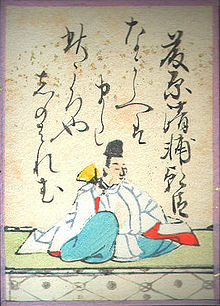Fujiwara no Kiyosuke

Fujiwara no Kiyosuke (藤原清輔, 1104-1177[1][2][3][4]) was a Japanese waka poet and poetry scholar of the late Heian period.[2][3][4][5]
He was the second[6] son of Akisuke (顕輔), compiler of the Shika Wakashū.[2][3][4]
Poetry[]
The following poem by him was included as No. 84 in Fujiwara no Teika's Ogura Hyakunin Isshu:
| Japanese text[5] | Romanized Japanese[7] | English translation[8] |
|
|
|
He was a member of the conservative Rokujō school of poetic composition, and Donald Keene has called him a "mediocre poet".[9] Suzuki et al., however, say that his brilliant poetry scholarship put him at the top of the waka world in his day.[10]
He was one of the first to apply rules of choosing themes, participants and judges in the uta-awase poetry gatherings.[11] His standards of judging poetry, made him a rival of Fujiwara no Shunzei.[12]
About 1165, Emperor Nijō commissioned him to compile a waka anthology, which became the Shoku Shika Wakashū (続詞花和歌集, "Continued Shika Wakashū", also called Shoku Shikashū).[6][13] He compiled twenty books of 998 poems, a much larger anthology than its namesake, and submitted to the emperor expecting for it to be recognized as the seventh imperial anthology.[13] The emperor died before its completion, and it remains consigned to the status of a private collection.[6][13] Ultimately ninety-four of his poems were included in imperial collections.[6]
Scholarship[]
Kiyosuke is known primarily as the author of the (袋草紙, compiled before 1159[14][15]) and the (奥義抄, compiled 1124~1144[16][17])[9] He was one of the first scholars to question the traditional 905 date of the Kokin Wakashū.[1]
References[]
- ^ Jump up to: a b Keene 1999 : 250.
- ^ Jump up to: a b c article "Fujiwara no Kiyosuke". 2007. Hitachi Systems & Services.
- ^ Jump up to: a b c Britannica Kokusai Dai-hyakkajiten article "Fujiwara no Kiyosuke". 2007. Britannica Japan Co.
- ^ Jump up to: a b c Digital Daijisen entry "Fujiwara no Kiyosuke". Shogakukan.
- ^ Jump up to: a b Suzuki et al. 2009 : 106.
- ^ Jump up to: a b c d McMillan 2010 : 147 (note 84).
- ^ McMillan 2010 : 172.
- ^ McMillan 2010 : 86.
- ^ Jump up to: a b Keene 1999 : 337 (note 154).
- ^ Suzuki et al. 2009 : 106 "歌学にすぐれ、当時の歌壇の第一人者となる。"
- ^ Keene 1999 : 648.
- ^ Keene 1999 : 649-650.
- ^ Jump up to: a b c Keene 1999 : 319.
- ^ Britannica Kokusai Dai-hyakkajiten article "Fukuro Zōshi". 2007. Britannica Japan Co.
- ^ Digital Daijisen entry "Fukuro Zōshi". Shogakukan.
- ^ article "Ōgishō". 2007. Hitachi Systems & Services.
- ^ Digital Daijisen entry "Ōgishō". Shogakukan.
Bibliography[]
- Keene, Donald (1999). A History of Japanese Literature, Vol. 1: Seeds in the Heart — Japanese Literature from Earliest Times to the Late Sixteenth Century. New York: Columbia University Press. ISBN 978-0-231-11441-7.
- (2010). One Hundred Poets, One Poem Each. New York: Columbia University Press. ISBN 978-0-231-14399-8.
- Suzuki, Hideo; Yamaguchi, Shin'ichi; Yoda, Yasushi (2009). Genshoku: Ogura Hyakunin Isshu. Tokyo: Bun'eidō. ISBN 4-578-10082-0.
External links[]
- E-text of his poems in Japanese.
- 12th century in Japan
- 12th-century Japanese poets
- 1104 births
- 1177 deaths
- Fujiwara clan
- Hyakunin Isshu poets